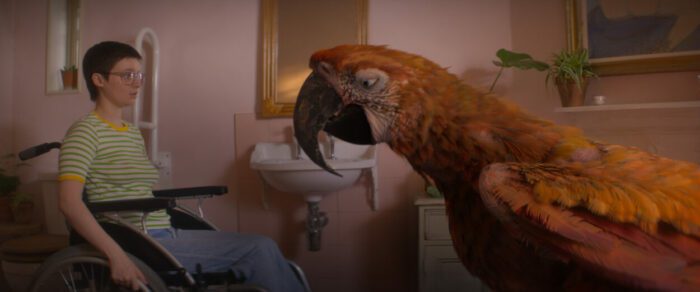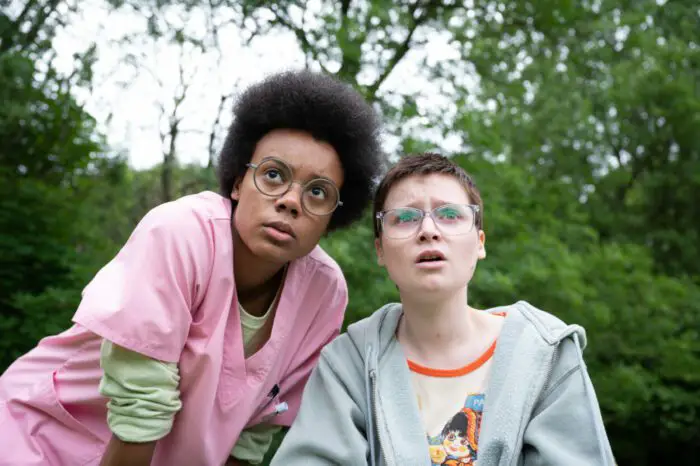Tuesday endeavors to make death palatable. This modern fairytale tackles the notion of mortality with a marvelous blend of dramatic magical realism. Although the topic and its conclusions are nothing new, the way the subject matter is handled is engagingly unique. If anything, the biggest complaint is that the film runs a little too long.
The story centers on Zora and her dying daughter Tuesday. When Death arrives in the form of a mystical macaw, the pair are forced to deal with the inevitable. All the things that have gone unspoken about their situation come to the forefront, and some of the choices made end up imperiling the world. However, their journey leads to a cosmic truth.

One of the best aspects of Tuesday is the depiction of Death. Arinzé Kene provides a captivating voice that fits the cosmic entity not only by giving it gravity but a weariness that pulls at the heart. Furthermore, the specials effects which bring the bird to life are splendid. And this unique interpretation of the being is oddly fitting. Death is almost as tragic an entity as those it comes for.
The subject matter is the type of material that it’s easy to be cynically sarcastic about. For instance, a snarky reading of the film might conclude Tuesday is about middle-class white people thinking mortality doesn’t apply to them then, realizing the necessity of Death, they gift it to the world. But I think such sarcasm may stem from the difficulty of the material.
Mortality isn’t a subject easily approached, and even in its fairytale styling Tuesday can conjure certain thoughts many audiences would rather avoid. It’s almost easier to make fun of the film than engage with it honestly. Yet, the ideas it puts forward are delivered in a digestible manner without ever getting nauseatingly cloying or pretentiously preachy. If nothing else, Tuesday easily enters the growing bracket of modern fairytales such as Lamb (2021), You Won’t Be Alone (2022), or Three Thousand Years of Longing (2022)—films which use fantasy and magical realism to delve into the human condition.

Credit: By Kevin Baker. Courtesy of A24.
Some of the nuances Tuesday explores were remarkably refreshing. The main characters, Zora in particular, present more than just grief. And the fact that each individual gets to explore their emotions makes it plain how multifaceted loss is as an experience. In addition, Tuesday shows how Death may be a welcome thing given the right circumstances.
With that in mind the film tackles a multitude of themes. There’s room to consider it a take on the right to die. It also makes sure to note that letting go is only part of the process. The living must endure the banality of existence after others have shuffled off the mortal shell. Then, of course, there are obvious cinematic ruminations on mortality, accepting loss, and humanity’s cosmic insignificance.
Fortunately, writer-director Daina O. Pusić mines such subject matter with a deft hand. Tuesday has a cinematic feel that calls to mind Grimms’ fairytales. There’s a touch of darkness to everything that makes the brighter moments shine all the more so. When necessary, a sprinkling of comedy lightens the mood. It certainly doesn’t hurt having a versatile cast to help enrich the narrative.

Lola Petticrew (A Bump Along the Way) portrays Tuesday more like a teen straining to have a relationship with an estranged parent than someone dying. They present someone alive yet well aware the end is coming, and matured by that understanding, her precocious nature is a bit more acceptable. Julia Louis-Dreyfus is better known for her comedy work in television shows such as Seinfeld and Veep. Here she gets a moment to show the dramatic side of her acting talents and does not disappoint. Meanwhile, Leah Harvey (Foundation) rounds out the main roles as Nurse Billie. They do a wonderful job with the part, though the character isn’t around much to feel fully fleshed out.
That’s because the film focuses so much on Zora, Tuesday, and Death that all else falls by the wayside. Though this microcosm allows for the exploration of several universal themes surrounding mortality and family relationships, it never really visits anywhere terribly new. Grief is hard, anger is a part of loss, watching loved ones die is difficult, death is a necessity—the main problem being that towards the middle of the movie Pusić has made certain points so clear that Tuesday starts to drag as it emphasizes notions it already solidified.
Still, once the film gets back on track this fairytale wings its way to a strangely comforting conclusion. Some audiences may find the material as well as its exploration pretentiously pointless since it never goes anywhere new. However, there are only so many ways to dissect death. What makes Tuesday intriguing is the unique way the topic is approached. This is a fantastical drama that endeavors to make a difficult topic palatable. That isn’t to suggest this movie will leave audiences calmly at peace with their mortality, but it certainly leaves a sunnier perspective than reading Mortality by Christopher Hitchens.
Stellar special effects help turn a grim topic into a fairytale. Writer-director Daina O. Pusić has done a solid job crafting a cinematic exploration of mortality that is occasionally comical but mostly relatable. Though the film runs a tad too long, overemphasizing points it makes clear early on, Tuesday is enjoyable enough for one watch.



